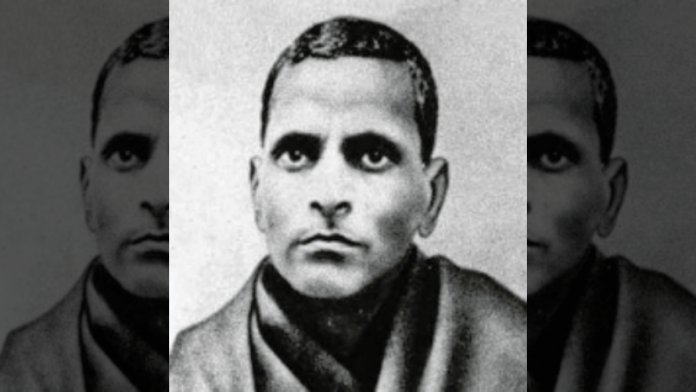In 1952, when Potti Sriramulu said to the people of Madras, “Now I have come to the conclusion that further work is impossible without an Andhra State,” few expected that his statement would echo to this day.
Indian revolutionary Sriramulu’s now-forgotten struggle left an imprint not only on the history and the creation of Andhra Pradesh but the geography of the country as well. Known as ‘Amarajeevi’, or the immortal being as the Telugu-speaking region reveres him, the freedom fighter’s legacy lives on.
Sriramulu started as a railway worker from Nellore, reeling from the loss of his wife and child. He laid down his life for linguistic liberation and the creation of an independent Andhra Pradesh.
It was his ability to fast for long periods of time for a cause he believed in that catapulted him to national prominence during India’s freedom struggle.
M.K. Gandhi was greatly impressed with his ability to live without food and said, “If only I have 11 more followers like Sriramulu, I will win freedom [from British rule] in a year.”
Choosing Gandhi
Born to a modest Komati family in 1901, Potti Sriramulu’s formative years in Nellore were disrupted by a forced move to Madras due to a famine.
While he was completing college at the Victoria Jubilee Technical Institute in Bombay, Gandhi was turning the Congress into a decisive weapon in the freedom struggle by launching the Non-Cooperation movement in 1920. With a new Constitution based on a linguistic division of provinces and the start of a new Satyagraha, Gandhi’s call for unity and statehood were heard across the heartland and resonated with many.
As Gandhi resisted the salt tax to begin the Civil Disobedience Movement in the late 1920s, a distraught Sriramulu was reeling from the loss of his family, losing all interest in professional and worldly troubles. Vexed by the futility of his regular life, he found himself at a crossroads — having to choose between unsatisfyingly serving his institution or selflessly serving Gandhi.
Bengali writer Nagendranath Gupta in Leaders of the Nationalist Movement rightly said that the Gandhi-led movement brought forth some of the greatest men that India knew and “if Mahatma Gandhi is the prophet, they are undoubtedly his apostles.”
Sriramulu was one of these apostles who first met Gandhi during the Dandi March and expressed the desire to serve in the struggle and learn the Gandhian way.
Fighting his inhibitions and the pressure from his family and friends, strong-willed Sriramulu went on to take his place at the Sabarmati Ashram by 1930. Over the next two decades, he became a permanent part of Gandhi’s ensemble and was also arrested multiple times during the Salt Satyagraha. Serving the Gandhian ideology of ‘finding self by diving into service of others,’ Sriramulu dedicated his time to village reconstruction in Rajkot and Bihar. While that gave him happiness, his life at the Ashram lacked a peculiar satisfaction.
Gandhi Smarak Nidhi flourished in other parts of the nation but fell short of its mark in Andhra Pradesh. As the sanchalak (director) of the Andhra Pradesh unit of the public service institution, Sriramulu’s efforts were failing to progress.
After much agony and careful consideration, it was here that Potti Sriramulu resolved to vouch for an independent Andhra state.
Also read: AP formation day is flashpoint between Jagan-Naidu, but in Andhra nobody agrees on a date
Unto death
Sriramulu’s ability to live without food was the sharpest tool in his arsenal.
In December 1946, he undertook a fast unto death, demanding that the temples of Madras be opened to the Dalit community, drawing public attention away from the Independence struggle. Many senior Congress leaders urged him to end his fast, but it wasn’t until Gandhi persuaded him that he did so. He undertook another fast for the further upliftment of the Dalit community when he tried to get favourable orders from the Madras government.
About Sriramulu’s 1946 fast, historian Ramachandra Guha said, “In 1952, the Mahatma was dead; in any case, Andhra meant more to Sriramulu than the Harijans once had. This fast he would carry out till the end, or until the Government of India relented.”
According to an article by TIME magazine, the fast went on for six weeks to people’s surprise. In a frantic letter to Madras chief minister C. Rajagopalachari talking about “some kind of fast going on for the Andhra Province,” Prime Minister Jawaharlal Nehru wrote that he was totally unmoved by the “frantic telegrams” and proposed to ignore it completely.
As Sriramulu grew weaker, strikes and protests across the country intensified and Andhra lobbyists squabbled to convince Nehru. The latter, however, stood firm in his resolve despite grave destruction of public property and calls for hartals in various cities.
By now, Sriramulu did not have much of a fight left. Crisis-struck, pallid, unable to breathe, and unwilling to abandon the fast, he slipped into a coma.
Also read: Madapati Hanumantha Rao, Hyderabad’s first mayor who led the renaissance of Telugu
Winning statehood
Nehru was finally understanding the power of the demand for Andhra statehood.
In an article for The Hindu, Ramachandra Guha mentions a letter that Nehru wrote to Rajagopalachari a few days before Sriramulu’s death. In the letter, the PM wrote, “Complete frustration will grow among the Andhras, and we will not be able to catch up with it.”
However, a delay in the formal announcement led to Potti Sriramulu continuing his fast, and eventually, the revolutionary breathed his last on 15 December 1952. Reacting to Sriramulu’s ‘supreme sacrifice,’ Madras witnessed a violent purge from groups of acolytes, including students, youths, and workers alike. The Communists even suspected a deliberate delay by Nehru.
By the end of that week, Nehru announced that his government had decided to establish a separate Andhra state. As the ‘Founding Father’ of Andhra Pradesh, Potti Sriramulu starved for 58 days, but his death ignited the cause of linguistic liberation for many more states in India.
(Edited by Humra Laeeq)






